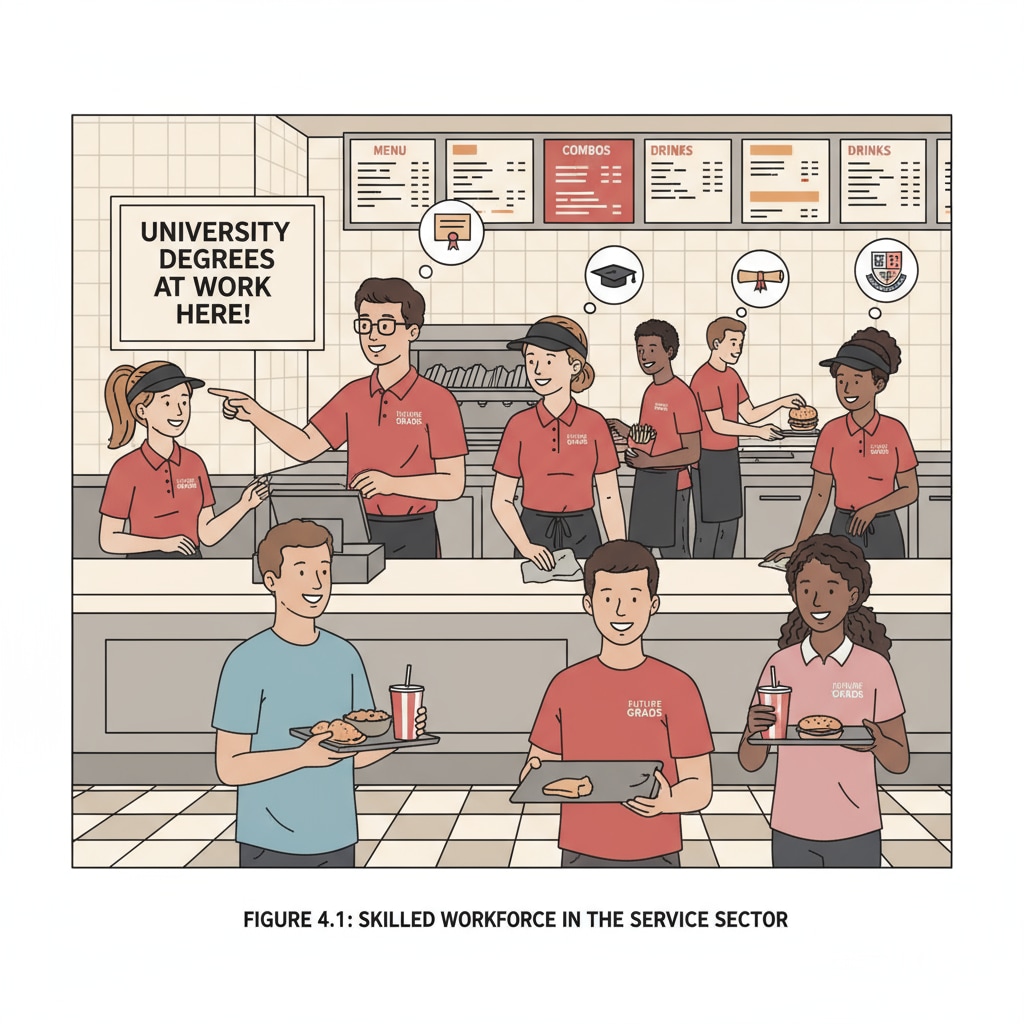In today’s society, the relationship between university degrees, the job market, and career development has become a topic of great concern. The traditional view that obtaining a university degree guarantees a high-paying job and a successful career is being challenged. Take the fast-food industry as an example.

There are now many individuals with university degrees working in this field, which makes us question the real value and returns of university degrees.
The Traditional Belief about University Degrees
For a long time, society has held the belief that higher education is the key to a prosperous future. Parents and students alike invest a great deal of time, money, and effort into obtaining a university degree. The assumption is that this degree will open the doors to well-paying jobs in prestigious companies, leading to a smooth and successful career development path. According to Education economics on Wikipedia, the investment in education is seen as an investment in human capital, which is expected to yield high returns in the job market.

The Reality in the Job Market
However, the reality in the job market is quite different. In recent years, the number of university graduates has been increasing steadily, while the number of high-quality job opportunities has not grown at the same pace. As a result, many graduates find themselves in jobs that are not in line with their educational backgrounds. The fast-food industry is a prime example. Many workers in this industry have university degrees but are performing tasks that do not require such high levels of education. This phenomenon makes us realize that the job market is more complex than we thought, and a university degree alone is no longer a guarantee of a good job. As stated on Employment economics on Britannica, the labor market is influenced by various factors, and educational qualifications are just one of them.
Another factor contributing to this situation is the changing nature of jobs. With the rapid development of technology, many jobs are being automated or outsourced. This means that even if a graduate has a university degree, they may still face difficulties in finding a suitable job. For example, some administrative and data entry jobs that used to be filled by graduates are now being done by machines or workers in other countries with lower labor costs.
Readability guidance: We’ve explored how the traditional view of university degrees clashes with the job market reality. The next section will discuss the implications for career development.
The Impact on Career Development
The mismatch between university degrees and job opportunities has a significant impact on career development. Graduates who end up in jobs that do not utilize their full potential may feel frustrated and unfulfilled. This can lead to a lack of motivation and a slowdown in career progression. In addition, the skills and knowledge acquired during university may become obsolete if they are not relevant to the job. For instance, a graduate with a degree in a particular field may find that the industry has changed significantly, and their skills are no longer in demand.

However, it’s not all doom and gloom. Some graduates are able to turn this situation around by taking advantage of the skills they have developed during university, such as critical thinking, problem-solving, and communication skills. They may find opportunities to transfer these skills to other areas or industries and start a new career path. For example, a graduate with a degree in liberal arts may use their writing and communication skills to enter the field of marketing or public relations.
Readability guidance: We’ve seen how the job market affects career development. Now, let’s consider the new realities of educational investment.
The New Realities of Educational Investment
Given the current situation in the job market, it’s important to reevaluate the concept of educational investment. Instead of simply focusing on obtaining a university degree, students should also consider the practical skills and knowledge that are in demand in the job market. This may involve choosing a major that has better job prospects or obtaining additional certifications and training. For example, a student interested in the technology field may choose to study computer science or a related discipline and also gain practical experience through internships or online courses.
In addition, lifelong learning has become crucial in today’s rapidly changing job market. Even after graduating from university, individuals need to continuously update their skills and knowledge to stay competitive. This could involve taking part-time courses, attending workshops, or obtaining professional certifications. By doing so, they can increase their chances of finding better job opportunities and advancing their careers.
In conclusion, the relationship between university degrees, the job market, and career development is more complex than ever. While a university degree still holds value, it’s no longer a guaranteed ticket to success. We need to adapt to the new realities and find ways to make our educational investments more worthwhile. By understanding the challenges and opportunities in the job market, we can better prepare ourselves for a fulfilling and successful career.


